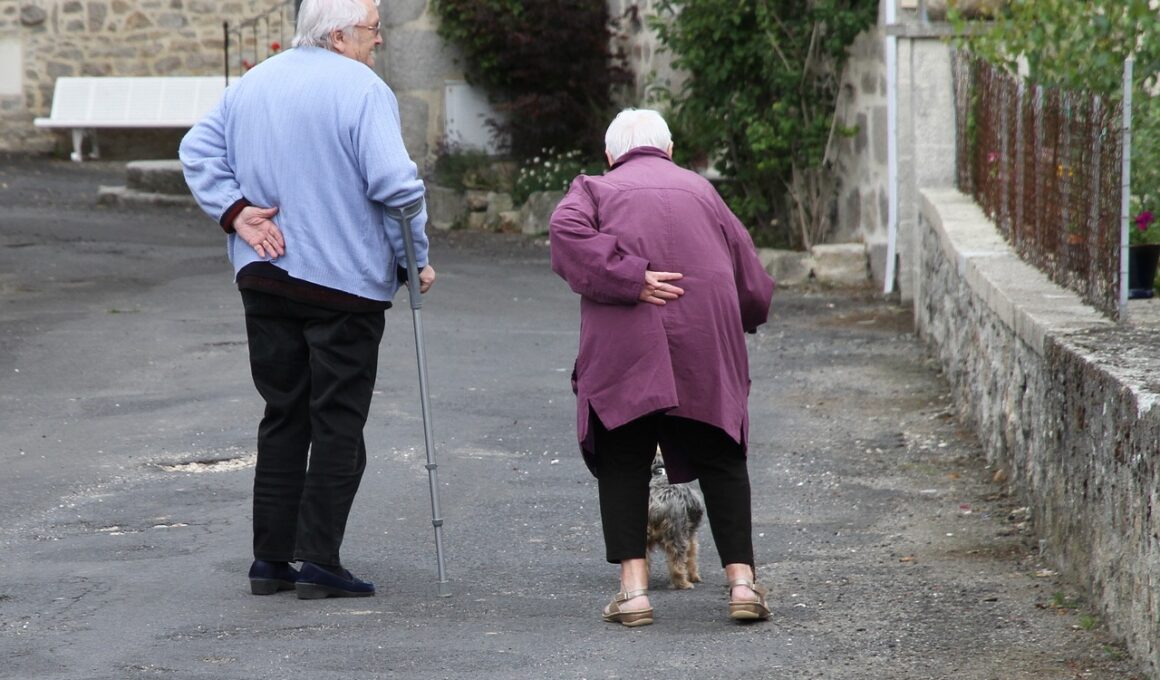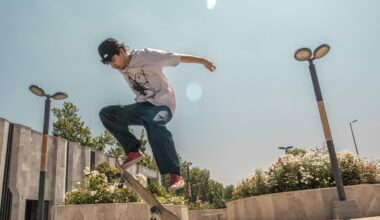Selecting the Best Marathon Events for Older Competitors
Choosing the right marathon event is crucial for older adults who are passionate about running. Consider the terrain when making a selection. Flat courses generally pose fewer challenges than those with hills, making them ideal for older athletes. Weather conditions play an equally significant role; extremely hot or cold climates can be taxing on the body. Look for races held during mild weather to optimize performance. Additionally, consider event size. Smaller races often provide a more intimate atmosphere, fostering camaraderie and support among participants. This support can be particularly beneficial for older runners, who may require more encouragement and assistance. Furthermore, facilities offered at the event, such as aid stations and medical support, are key factors. Ensure the event includes ample hydration points, especially in longer races. Medical assistance is also essential, as older adults may have specific health concerns. Finally, don’t overlook the organization of the event. Check reviews to ascertain the smooth running of prior races. A well-organized marathon enhances the experience significantly, boosting confidence and safety for older competitors. Thorough research will enhance readiness and enjoyment on marathon day.
Once the marathon event is chosen, older adults must focus on training effectively. It’s vital for older competitors to create a training schedule that accommodates their fitness levels and physical limitations. Start with a gradual buildup of mileage, ensuring that rest days are incorporated into the regimen. Overtraining can lead to injuries, which are more likely in older runners due to decreased recovery abilities. Cross-training is highly recommended to promote overall fitness without excessive strain on the body. Activities such as swimming or cycling can enhance cardiovascular health while providing necessary diversity to the workout routine. Furthermore, strength training should not be overlooked. Incorporating resistance exercises helps prevent muscle degeneration and enhances joint stability. Stretching before and after workouts can alleviate stiffness and improve flexibility. Incorporate dynamic stretches to warm up before running and static stretching thereafter. Nutrition plays an equally critical role in performance. Older adults should focus on a balanced diet rich in proteins, carbohydrates, and healthy fats. Staying hydrated is essential, especially during long runs. Proper nutrition fuels training and aids in recovery, ultimately optimizing marathon day performance, maintaining enthusiasm for running and improving overall well-being.
Consideration of Race Timing
Timing of the marathon event also warrants consideration. Many marathons are scheduled at various times of the year, and older runners may prefer spring or fall races. These seasons typically offer milder temperatures, which facilitate better running conditions. The time of day the race starts can greatly affect performance; consider events that start later in the morning to allow for adequate rest before race day. Emphasis on adequate sleep in the days leading up to the race is vital, as older adults may require more rest to perform at their best. Beyond timing, the location of the marathon is equally important. Factors such as accessibility and accommodation nearby should be assessed. Older athletes may benefit from proximity to medical facilities, ensuring peace of mind during the event. Planning travel arrangements well in advance helps alleviate stress. A well-organized trip ensures that the competitor can focus on the race. Familiarizing oneself with the course before race day can enhance confidence and allow for better pacing strategies. Taking time to visit the marathon site enables older competitors to prepare mentally and physically, which is essential to achieving personal goals and enjoying the experience.
In addition to conventional events, older adults might explore themed marathons that provide a fun twist. These events often include festive atmospheres and engaging activities, making them appealing to a broader range of participants. For instance, costumes are encouraged in themed marathons, fostering camaraderie among runners. Events featuring charity aspects can also enhance motivation; knowing that every mile runs contribute to a cause adds meaning to the race. Older runners might find that their social connections grow from participating in these fun atmospheres, further encouraging a sense of belonging and community. Additionally, some marathons cater specifically to aging participants, with modified courses or tailored support services. These specialized events may offer a more comfortable environment, allowing older individuals to train and race with peers who share similar fitness levels and experiences. By engaging in such niche marathons, older athletes often experience less pressure and greater enjoyment. An increase in social interaction enhances motivation and persistence in training routines. Ultimately, the choice of a marathon should reflect individual preferences, including the atmosphere, purpose, and community associated with the event.
Training Strategies for Older Runners
When it comes to marathon training for older adults, it is essential to adopt effective strategies that cater to specific needs. Progression should be gradual; avoiding injury while building endurance is key. Utilize the principles of periodization in training, alternating between easy, moderate, and intensive weeks to maximize gains without risking fatigue or burnout. Incorporate walking intervals during runs, as this approach allows for necessary rest periods, maintaining the joy of running. As older adults progress, listen to the body’s signals. If fatigue sets in, it’s crucial to adjust training intensity rather than risk injuries. Joining running clubs geared towards older athletes can provide motivation and support while also reducing feelings of isolation. The social aspect of these clubs often results in shared experiences and camaraderie, fostering greater commitment to training regimens. Emphasis must also be placed on fueling the body adequately before, during, and after training runs. The inclusion of wholesome snacks ensures energy levels remain stable, and nutrients aid recovery. Finally, prioritize consistency; regular training sessions enhance muscle memory and stamina, ensuring improved performances during marathon events and creating lasting health benefits.
Another important aspect of marathon preparation for older adults is the role of mental readiness. Mental training should be integrated into physical preparation, ensuring that competitors remain focused and resilient. Visualization techniques are powerful tools. Regularly envisioning success not only boosts confidence but also helps runners mentally navigate race course challenges. Staying positive is crucial; adopting a growth mindset enables older runners to embrace challenges rather than feel discouraged by them. Equally important is the practice of mindfulness, which can help manage anxiety and maintain composure on race day. Older athletes may find themselves feeling pressure during the race, and having mental strategies can help ease performance nerves. Setting realistic goals helps maintain perspective; rather than fixating on winning, focus on personal achievements. Completing a marathon, no matter the time, is an accomplishment worth celebrating. Additionally, developing an adaptable race mindset empowers older runners to adjust their strategies based on physical feelings and environmental conditions throughout the event. Preparing mentally is as significant as physical training, and ensures greater enjoyment and fulfillment from the marathon experience.
Post-Marathon Considerations
Completing a marathon is a profound achievement for older adults, but post-race recovery is equally critical. Many may be eager to jump back into training, however, it is essential to allow sufficient recovery time. The body requires a chance to heal after such exertion, especially for older individuals who may have experienced fatigue or muscle soreness. Participating in gentle recovery activities, such as walking or light cycling, can aid in restoring circadian rhythms and alleviate stiffness. Stretching has proven benefits for recovery, improving flexibility and reducing potential injuries. Consider engaging in therapeutic practices like massage or yoga to promote relaxation and rejuvenation. Moreover, it is vital to maintain proper hydration and nutrition after the marathon; refueling the body with healthy foods is crucial during the recovery phase. Incorporating nutrient-rich options such as leafy greens and lean proteins will support healing. Evaluating performance can serve as a powerful motivational tool; reflecting positively on the race experience and establishing goals for future events can inspire continued joy in running. Ultimately, the journey doesn’t end on marathon day; maintaining post-event diligence paves the way for future successes in running endeavors.
In conclusion, selecting the best marathon events for older competitors involves several factors, including terrain, timing, and support systems. It is imperative to choose a marathon that aligns with individual preferences and conditions. Critical considerations include examining race organization, medical availability, and participant atmosphere. Research must extend to training approaches, recognizing that effective preparation enhances endurance and performance. Moreover, the mental aspect of preparation cannot be understated; fostering a positive mindset and confidence improves race experiences immensely. Engaging in social aspects of the marathon community further reinforces motivation and enjoyment of running. The beauty of running a marathon lies in both personal achievement and the shared experience with fellow participants. Older adults should embrace this passion, recognizing that marathons serve as platforms for physical, mental, and social wellness. Whether aiming for a personal-best time or simply enjoying the journey, approaching the marathon with enthusiasm remains essential. Remember, it’s not merely about the finish line, but also about the moments leading up to it. Committing to training, self-care, and a positive outlook aligns perfectly with the spirit of marathon running for older adults.


